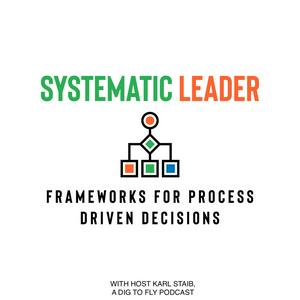Small Steps, Big Results with Tony Guarnaccia
Join us for a discussion about breaking down challenges into small, manageable steps — a lesson that shaped his systems-driven approach to business. After COVID-19 devastated his marketing agency, Tony pivoted to software development, creating Guestify and an AI marketplace. He introduces his "Results Loop" framework for business growth, focusing on internal factors like market definition and external factors like customer loyalty. Tony also highlights how he uses AI tools collaboratively to streamline software development and reflects on how his mother's resilience inspired his entrepreneurial mindset.
You can get the Magnetic Systems Method (and other systems guides) to find issues before they become expensive problems.
Highlights from the interview:
1. Overcoming challenges through systems
Tony shares how he learned the importance of breaking down complex tasks into small, manageable steps from his musical training and his mother's experience overcoming polio. This foundational lesson of "small steps, big results" has shaped his approach to building successful systems and businesses.
Watch the 5-minute System Segment on YouTube.
2. Pivoting from agency to software
When Tony's marketing agency was severely impacted by the COVID-19 pandemic, he made the strategic decision to pivot his focus to developing scalable software. This transition led him to create Guestify, a podcast guest booking system that leverages AI, as well as an AI marketplace - aligning with his passion for systems and automation.
3. The "Results Loop" system for business growth
Tony explains his "Results Loop" system, which outlines the key internal and external factors for exponentially growing a business. The internal factors include defining the target market, offerings, and value proposition, while the external factors focus on increasing the number of buyers, size of transactions, and customer loyalty.
4. Leveraging AI for software development
Tony discusses his process for utilizing AI tools like ChatGPT, Claude, and Anthropic Gemini to streamline his software development. He describes how he combines the strengths of different AI models to conceptualize designs, generate code, and debug issues - an iterative, modular approach that allows him to efficiently build and refine his products.
5. Gratitude for his mother's resilience
Tony expresses deep gratitude for his mother, who overcame polio and served as a role model for resilience and determination. Her example of breaking down challenges into small, achievable steps has been a profound influence on Tony's own entrepreneurial journey and systems-focused mindset.
Check out his marketing manifesto: https://smallstepsbigprofits.com/manifesto-confirmation/
Learn more about Tony Guarnaccia over at his website. You can also connect with him on LinkedIn. You can also check out his marketing manifesto to learn more about his system of growing a business.
You can get the Magnetic Systems Method (and other systems guides) to find issues before they become expensive problems.
As always, if you have any questions or want to submit an amazing guest for the podcast, just reach out to me on the Systematic Leader website, and I’ll do my best to get them on. If you enjoy the interview, please take 30 seconds to rate the Systematic Leader podcast on your favorite platform. Thanks!
